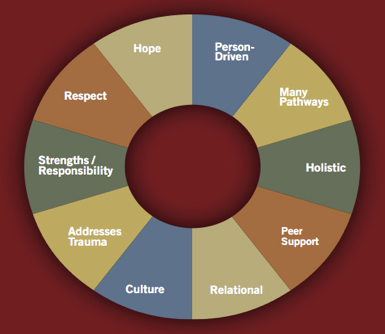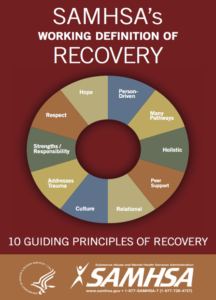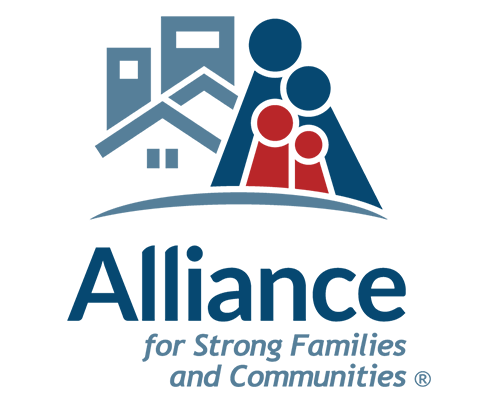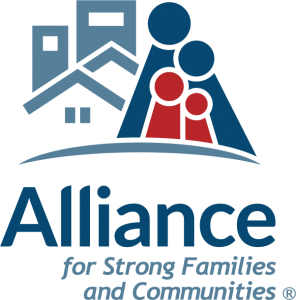The national accrediting bodies have been among the moving forces in the integration of the recovery model into the care, treatment and services for people with mental health and/or substance use disorders. Recovery principles can now be seen throughout behavioral health standards of accrediting bodies as well as the outlined expectations that an organization will demonstrate conformance/compliance to these standards. And, the integration makes sense – this model not only complements the more traditional model of medication and “talk” therapies, but also expands the focus to include the person’s own goals and strengths and empowers them to be actively involved in the process.
The US Substance Abuse and Mental Health Administration (SAMHSA) has also integrated the recovery model in their publications, requirements for certified community-based behavioral health clinics, training materials, and grants. To that end – they’ve developed the Working Definition of Recovery. Several of the guiding principles shown here are addressed in the accrediting bodies’ standards.
Accrediting bodies’ implementation of such a model involves workforce training so that staff can fully understand and embody the organization’s philosophy, thus permeating service delivery to positively impact the recovery of the people served. In addition, the accreditation survey process itself supports the recovery principles. Surveyor(s) not only review written documents, but also observe interactions amongst staff at all levels and persons served and share their observations with the organization. This external survey can confirm, enhance, and strengthen the organization’s intent and commitment to recovery principles
While accreditation as a whole supports the recovery model, below are specific examples of ways in which accreditation and the recovery model intersect:
Person-Driven – An individualized plan of care, treatment, and services based on the needs, strengths and abilities, preferences/expectations and goals of each person being provided care, treatment or services is a core accreditation requirement. “Boiler plate” plans that repeat over and over the same information for each person served will result in survey findings (unsatisfactory conformance/noncompliance with standards) and the need for correction to achieve full accreditation. Furthermore, it’s an expectation that an accredited organization actively involve the person served in identifying their needs and preferences for aftercare and, as much as possible, making choices about where, type, and by whom.
Holistic – The needs of the person in relation to various life domains, such as physical health and housing, are addressed in case management/care coordination standards (assessment of the person’s needs and assistance in meeting these identified life domain needs). Since access to routine and needed physical health care can be a challenge for those who need it, the accrediting bodies offer options for the integration/coordination of physical health care. Health Home standards have been established to facilitate successful integration of physical health care with an organization’s traditional behavioral health programs.
Culture and Respect – Accreditation standards emphasize that the person served encounters respect in all aspects of their care, treatment, or service experience and this is reflected in the organization’s policies, procedures, rules, and expectations as well as the rights and responsibilities of the person served. Standards clearly emphasize that service delivery is provided by staff in an atmosphere of respect and understanding and sensitivity to cultural values, beliefs, and preferences.
Trauma – The approach of the accrediting bodies to trauma centers around their screening and assessment, planning and delivery of services, and workforce training standards. Standards require a screening and assessment process to identify people whose lived experiences either currently and/or in the past may have included trauma(s). Also, organizations need to demonstrate that the impact of trauma on the person served is considered in the planning and delivery of care, treatment, or services.
Peer Support – Peer support services are an important component of the recovery model. These services are part of the plan of care, treatment, or services, and are provided by trained individuals who share similar lived experiences with mental health and substance use challenges. Accrediting bodies not only recognize the utilization of this type of service by mental health and substance use treatment providers, but also have developed standards addressing the integration of these services into the planning of care with the active involvement of the person served.
The accrediting bodies require written plans, policies, or procedures promoting these recovery principles to form a framework for implementation and a communication to staff and people served of the philosophy, beliefs, and values of an organization.
For more information on the recovery model and/or how accreditation can benefit your organization, visit AccreditationGuru.com.
For more information or questions about the contents of this article, please write or call Jennifer Flowers @ Jennifer@AccreditationGuru.com / 212.209.0240. This post contains original content and was written for Accreditation Guru, Inc. Use of this copy is permitted with credit and reference within the same body of copy to Accreditation Guru, Inc.




